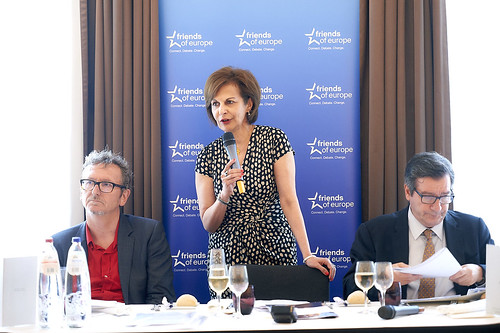
Summary
Participants at the 16 May Friends of Europe dinner debate “Boosting migrant & refugee integration: government and private sector cooperation” spotlighted that integration is the key issue facing the European Union, with challenges being poor management, a shortage of joined-up thinking and trouble accessing finances – not necessarily a lack of available resources.
Coming together to identify areas of cooperation, current gaps and good practices in the public-private relationship, participants broadly agreed that inclusion is a two-way street which must involve local communities as well as new arrivals. Practical examples were provided by speakers from the cities of Amsterdam and Athens, who showed that while the “crisis” situation may have abated for now, inclusion and integration remain ongoing challenges. Furthermore, some new arrivals may not have the incentive to integrate in their port of first arrival, making it clear that there is no one-size-fits-all solution for integrating newcomers. For successful integration, local government, the private sector, civil society and other stakeholders must understand and tailor responses to the differing aspirations and priorities of migrants, refugees and local communities.
During the debate, participants came to a consensus around several themes, including: the importance of newcomers having access to realistic networks rather than undergoing forced integration; the need to break down silos so that different stakeholders, including both public and private, can work together; the use of data to make smarter choices; and the promotion of common values.
About
There is an urgent need for realistic and comprehensive policies on migration and integration that address both challenges and opportunities. Short-term, deterrence-based solutions are clearly not the answer. Human mobility is a part of our history and people will continue to move across the globe for a variety of reasons. Migration is not a “crisis” and must be recognised as such by policymakers across the world but also by the private sector and civil society organisations. Silo approaches to tackling the challenge have proved to be unsuccessful. That is why the public and private sectors need to work together and combine their strengths and experiences.
Our by-invitation-only dinner debate is part of Friends of Europe’s Migration Action programme, which aims to examine the imperative of migration in the context of economic sustainability and demographics, as well as its impact on public services, communities and security. This occasion will bring government officials together with private sector representatives to identify areas of cooperation, current gaps and good practices. The discussion may also serve to inform the production of a subsequent publication.
- Friends of Europe Discussion Paper “Global flows: migration and security”
- “Europe’s corporate chiefs must explain why hiring refugees is a win-win outcome” by Giles Merritt
- “Academics can revive refugees’ dormant intellectual capital” by Carmen Bachmann
- “We must avoid losing the talents of a generation of refugee students” by Valerie Amos
Schedule
Poor management of migration at the local level leads to weaker integration and feeds into unrest and discontent among both host societies and newcomer communities. Many local governments have grasped the challenge and are demonstrating the link between integration and economic and social development. Crucially, the private sector is playing an important role in boosting integration efforts across Europe and beyond. From providing vocational and language training, to creating platforms linking qualified migrants and refugees to jobs and opportunities, they are playing an ever greater role in integrating newcomers. How can local governments and the private sector come together and pool their expertise to better address the challenges associated with integration? How can private sector technologies provide support to governments and at the same time allow refugees and migrants greater access to local opportunities and administration?
- What innovative solutions have governments and private sector actors enacted to improve integration?
- What benefits has the successful integration of migrants and refugees brought to host communities?
Kick-starters and participants
Elizabeth Collett
Director, Migration Policy Institute Europe (MPI), and Senior Advisor to MPI’s Transatlantic Council on Migration
Maurice Crul
Professor of Sociology at the Free University of Amsterdam
Neena Gill
Member of European Parliament
Georgios Kaminis
Mayor of Athens
Julie Pascoët
Senior Advocacy Officer at the European Network Against Racism (ENAR)
Moderator
Shada Islam
Managing Director at New Horizons Project
Continue
the debate on
- Debating Europe

